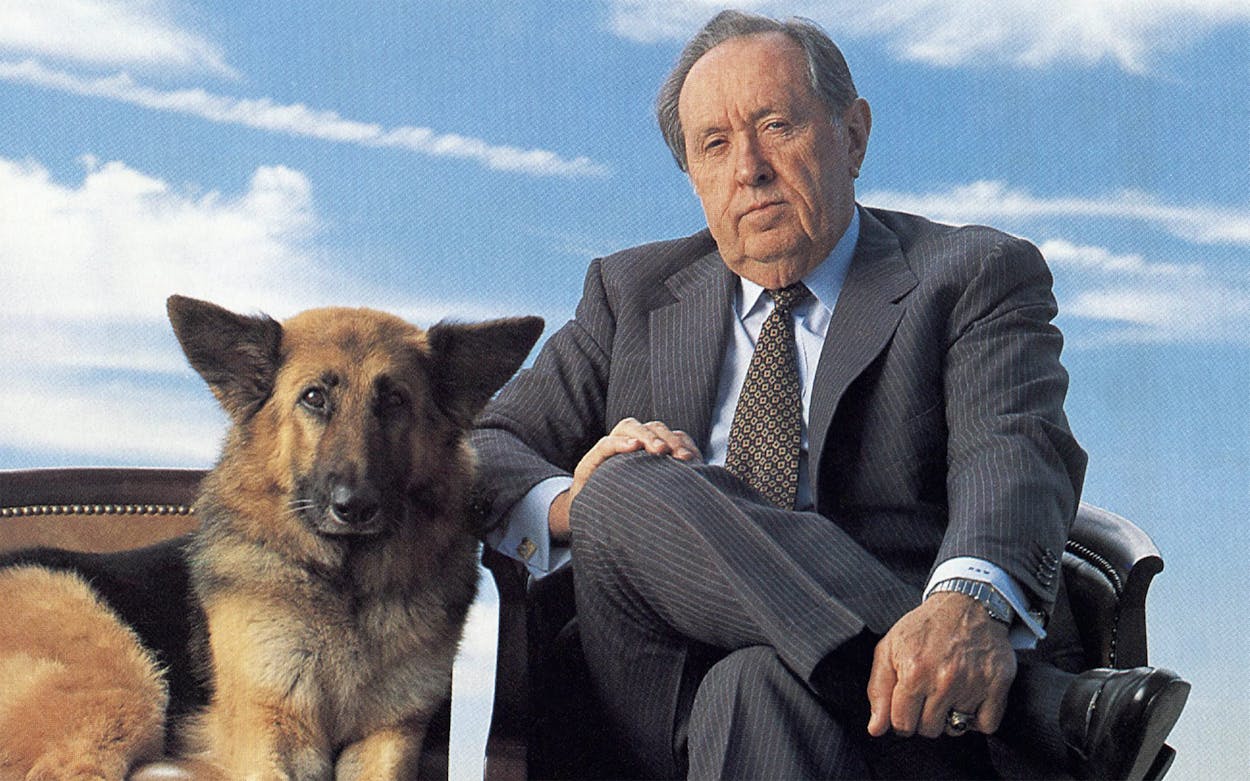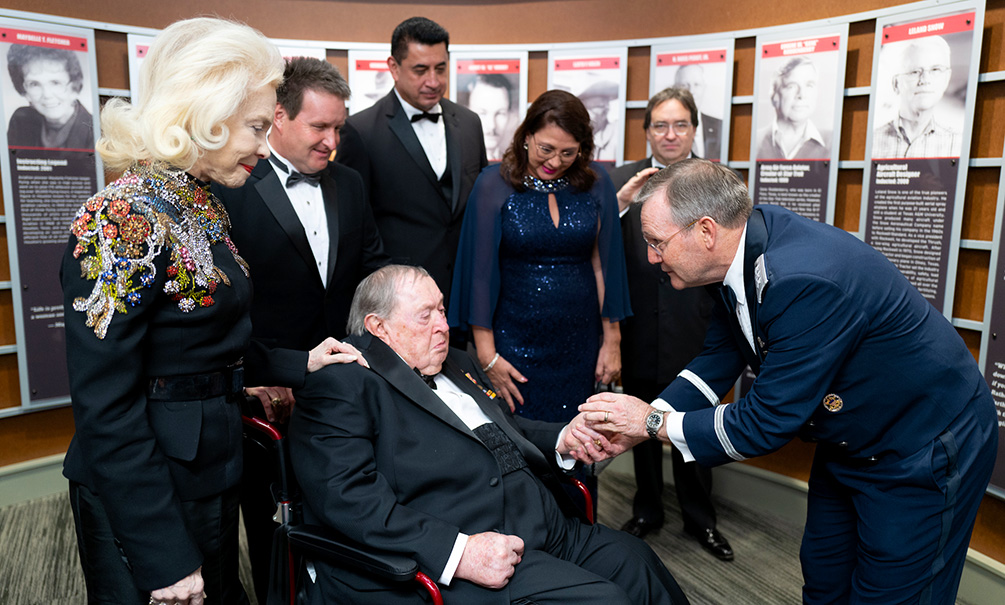
Oscar S. Wyatt Jr., the legendary Texas oil tycoon whose life spanned over a century, passed away on October 8, 2025, at the remarkable age of 101. His death in Houston marked the end of an era, closing the chapter on one of the last true wildcatters whose ambition, tenacity, and often controversial methods reshaped the American energy landscape. Mr. Wyatt was a figure of immense complexity, celebrated for his business acumen and resilience, yet also scrutinized for his confrontational style and willingness to navigate geopolitical minefields in pursuit of profit.
From humble beginnings in Beaumont, Texas, to the pinnacle of global energy markets, Wyatt’s journey was nothing short of epic. He built Coastal Corporation from an $800 loan into a Fortune 500 powerhouse, engaging with presidents and dictators, and leaving an indelible mark on both the business world and the political arena. This in-depth article will explore the multifaceted life of Oscar S. Wyatt Jr., examining the pivotal moments, defining characteristics, and enduring impact of a man who famously stated his objective was “to be profitable or popular. I’ve chosen to be profitable.”
His narrative is a compelling tapestry woven with threads of poverty, patriotism, audacious entrepreneurship, international diplomacy, and persistent legal battles. It is a story that personifies the rugged individualism and relentless drive often associated with Texas, demonstrating how one man’s vision, combined with an unwavering pursuit of opportunity, can create an empire and influence global events, even as it invites controversy and scrutiny.

1. **Humble Beginnings and Wartime Heroism:**Oscar Sherman Wyatt Jr. was born on July 11, 1924, in Beaumont, Texas, into circumstances far removed from the lavish lifestyle he would later cultivate. Abandoned by his father and raised by his single mother, Eva (Coday) Wyatt, in Navasota, Texas, his early life was one of hard work and resourcefulness. He toiled on a farm and at a gasoline station, experiences that undoubtedly instilled in him the grit and determination that would define his character.
Even as a teenager, Wyatt demonstrated an extraordinary drive. He earned a pilot’s license at the tender age of 16, quickly putting his skills to use by flying crop dusters for nearby cotton farmers. This early aptitude for aviation and self-sufficiency foreshadowed a life where he would consistently identify and seize opportunities, often creating them where others saw only obstacles. His strong academic performance also earned him a full scholarship to Texas A&M University.
His education, however, was dramatically interrupted by the Japanese attack on Pearl Harbor, prompting him to volunteer for the U.S. Army at age 17. Commissioned as a second lieutenant in the Army Air Corps, he served with distinction as a B-25 bomber pilot in the Pacific Theater during World War II. His wartime service was harrowing; he survived multiple plane crashes, including one instance where he was “presumed dead, covered with a white sheet, and transported with deceased service members until discovered alive.” He was wounded twice and decorated by age 21, receiving an honorable discharge as a Captain with numerous distinguished military awards, a testament to his bravery and resilience in the face of extreme adversity.

2. **Founding the Coastal Corporation: The $800 Loan and the Birth of an Energy Giant:**Upon returning from the war, Mr. Wyatt, through proceeds he earned by cotton farming, resumed his studies at Texas A&M University, graduating in 1949 with a Mechanical Engineering degree. His foray into the oil industry began modestly; he roamed the oil fields of South Texas, initially selling drill bits from the trunk of his 1949 Ford 2-door coupe, learning every detail of the oil and gas landscape. He worked for Kerr-McGee and Reed Roller Bits, and later became a partner in Wymore Oil Company, steadily gaining invaluable experience.
A pivotal moment arrived in 1950 when he spotted a unique opportunity. He noticed unwanted natural gas being flared at wellheads, a wasted resource, and devised a plan to purchase it and sell it to a pipeline operator. This early insight into market inefficiencies and his ability to connect producers with consumers became a hallmark of his career. It was this entrepreneurial spirit that fueled his next, most significant step.
In 1955, Mr. Wyatt took a bold leap, securing an $800 loan using his Ford coupe as collateral from a bank in Corpus Christi, Texas. With this modest sum, he founded the Hardly Able Oil Company, which soon evolved into the Coastal States Gas Producing Company. This company, later renamed Coastal Corporation, began with humble assets: just 68 miles of pipeline and 78 employees. From such small beginnings, Wyatt’s vision and relentless effort would soon forge one of the nation’s most formidable energy conglomerates, proving that even a small loan could be the genesis of a multi-billion dollar empire.

3. **Building a Petro-Empire: Pipelines, Refineries, Gas Stations, and Global Reach:**Over the next four decades, Oscar Wyatt meticulously expanded Coastal Corporation, transforming it into a hydra-headed energy empire that rivaled industry giants like Enron and El Paso Gas. His approach was comprehensive; as an engineer, pipeline operator, driller, and refiner, he was intricately involved in all phases of the company’s operations. He possessed an uncanny ability to calculate complex contract details in his head and could even order operational changes based on subtle “telltale smokestack emissions.”
Coastal’s diversified portfolio was truly impressive. It supplied heating oil to the Northeast, petroleum and natural gas to the Southwest, and marine diesel in the Caribbean, demonstrating a vast geographical reach. The company owned extensive pipeline networks, including the 20,000-mile system that transported five billion cubic feet of natural gas daily by the 1990s, featuring major arteries like the Iroquois and Great Lakes pipeline and the Empire State Pipeline. This infrastructure was critical to its market dominance, ensuring reliable distribution across vast regions.
The empire also boasted fleets of oil tankers and trucks, along with 962 Coastal gasoline stations spread across 33 states by 1999, supplied by four strategically located refineries including a 150,000 bbl per day refinery in Corpus Christi, Texas, and a 250,000 barrel per day refinery on Aruba. By the 1990s, Coastal employed as many as 20,000 people and recorded revenues exceeding $12 billion. Mr. Wyatt had successfully built a Fortune 500 competitor that produced and marketed petroleum, natural gas, electricity, and coal, showcasing his unparalleled ability to integrate and optimize complex energy operations on a global scale.

4. **The Unconventional Business Philosophy: “Profit or Popular” and Corporate Battles:**Oscar S. Wyatt Jr. was a man who embraced controversy, often operating with a business philosophy that prioritized profitability above all else. He was notoriously sagacious and rough-hewn, unafraid to challenge norms or engage in fierce corporate battles. His public statements often underscored this ethos, as he told The New York Times in 1985, “As a corporate manager, you have to have one objective — to be profitable or popular. I’ve chosen to be profitable.”
This unwavering pursuit of profit, however, came with a considerable trail of enemies and legal skirmishes. Mr. Wyatt was known to renege on contracts, which led to municipalities being left short of power. He aggressively raided corporate rivals, battled numerous lawsuits, and faced hostile takeovers. These actions resulted in significant fines and civil misconduct penalties, paint a picture of a businessman who pushed boundaries to the extreme. Texas Monthly magazine once famously dubbed him “meaner than a junkyard dog,” while many Texans drew parallels between him and J.R. Ewing, the amoral oil baron from the television series “Dallas,” a comparison Mr. Wyatt offered no excuses for.
His tenacity was legendary, a characteristic even his rivals recognized. Kenneth L. Lay, then chairman of Houston Natural Gas Corporation and later the disgraced founder of Enron, observed in 1985, “He is incredibly tenacious. Once Wyatt decides he wants to accomplish something, he continues to pursue it until he gets what he wants or runs into a brick wall.” This relentless drive, though often divisive, was undeniably a cornerstone of his success, enabling him to build and sustain an empire in a cutthroat industry where only the most determined survived.

5. **Global Outreach and Controversial Alliances: OPEC, Libya, and his Relationship with Saddam Hussein:**
Mr. Wyatt’s ambition extended far beyond the borders of Texas and even the United States, driving him to scour the globe for oil opportunities. He became a fixture at the Vienna meetings of the Organization of the Petroleum Exporting Countries (OPEC), establishing himself as a key player on the international energy stage. His foresight was evident when he began importing Chinese crude shortly after Washington established diplomatic relations with Beijing in 1979, demonstrating an ability to identify and capitalize on emerging markets.
His international dealings were often characterized by a willingness to engage with leaders and nations that were at odds with U.S. foreign policy, showcasing his independent and pragmatic approach. In the 1980s, for instance, he traded with Libya even as its mercurial leader, Col. Muammar el-Qaddafi, openly defied the Reagan administration. Wyatt’s acquaintances noted that he frequently boasted of his contacts and conflicts with U.S. Presidents — Ronald Reagan, George H.W. Bush, Bill Clinton, and George W. Bush — along with various governors and members of Congress, illustrating his comfort and skill in navigating complex political landscapes.
Perhaps his most significant and controversial international relationship was with Saddam Hussein, whom he first met in 1972 after Iraq’s oil industry was nationalized. As Hussein consolidated power, Coastal Corporation reaped substantial rewards throughout the 1970s and ’80s, becoming one of the United States’ largest importers of Iraqi oil. This deep-seated connection with Hussein would later plunge Wyatt into the most serious legal troubles of his career, yet at the time, it underscored his remarkable ability to forge alliances and conduct business in challenging geopolitical environments, always with an eye toward securing energy resources.

6. **The Hostage Negotiation Triumph: His Daring Mission to Baghdad in 1990:**The strong ties Oscar S. Wyatt Jr. cultivated with Saddam Hussein, though eventually leading to his downfall, also provided him with a unique platform for a humanitarian mission that temporarily cast him as an American hero. In 1990, following Iraq’s invasion of Kuwait, tensions escalated dramatically, and Iraqi forces took 21 American oil workers hostage in an attempt to avert a war. As Washington struggled for a solution, Mr. Wyatt took a bold and unconventional step.
Despite objections from the U.S. government, Mr. Wyatt traveled to Baghdad, leveraging his personal relationship with Saddam Hussein. In a daring act of private diplomacy, he negotiated directly with the Iraqi leader, ultimately securing the release of the American hostages. His return home with the freed workers was met with widespread relief and acclaim. He was hailed as a hero, and he openly wept with the families of those he had brought back, a rare public display of emotion from the often-gruff oilman.
This extraordinary event highlighted Mr. Wyatt’s singular influence and his willingness to act independently on the global stage. While many viewed his dealings with Saddam Hussein with suspicion, this episode demonstrated that his controversial connections could, at times, yield profoundly positive outcomes. It solidified his image as a man who could navigate intricate international relations, even when official channels were blocked, using his unique brand of diplomacy to achieve what others could not.



